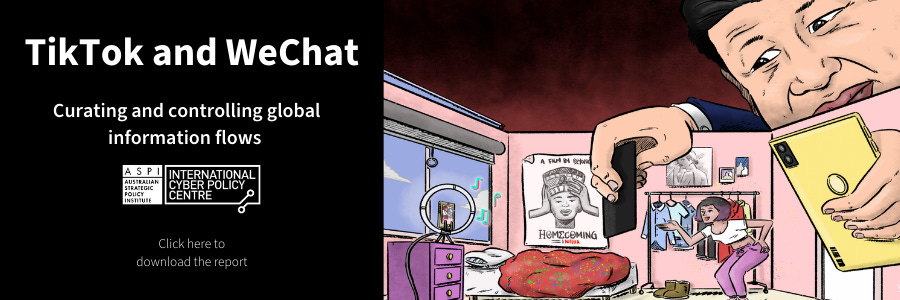US accuses Russian TV network of conducting covert intel acts | China uses LinkedIn to recruit academics for espionage, Czech intel warns | Israeli military’s digital tools risk civilian harm
Good morning. It's Monday 16th September.
The Daily Cyber & Tech Digest focuses on the topics we work on, including cybersecurity, critical technologies, foreign interference & disinformation.
Follow us on Twitter and on LinkedIn.
The United States, Canada and Britain on Friday accused Russia’s global television network, RT, of acting as an arm of that country’s intelligence agencies, announcing new sanctions meant to cut off international financing for disinformation operations around the world. The New York Times
In the latest BIS report, the Czech intelligence service found that China targets academics in the country. Through LinkedIn, Chinese intelligence services use “cover profiles of employees from fictitious consulting or headhunting companies, most commonly based in Singapore or Hong Kong,” to approach Czech academics, the report warns. EURACTIV
The Israeli military’s use of surveillance technologies, artificial intelligence, and other digital tools to help determine targets to attack in Gaza may be increasing the risk of civilian harm, Human Rights Watch said on Tuesday in releasing a question and answer document about the tools. Human Rights Watch
ASPI
AUKUS needs seamless data sharing. Here’s how to get it
The Strategist
Jocelinn Kang
AUKUS won’t work without seamless information sharing and data exchange between the partner nations and their private sectors. And getting that right will demand the establishment of a common federated cloud-based platform that leverages artificial intelligence, plus reforms to procurement processes within Defence to better harness private-sector innovation, and a cultural shift in Defence towards rapid and flexible technology adoption. Together, those moves will strengthen Australia’s strategic capabilities and its partnership with Britain and the US.
China takes lead in critical technology research after 'switching places' with US
VOA News
Adam Hancock
An Australian think tank that tracks tech competitiveness says China is now the world leader in research on almost 90% of critical technologies. In a newly released report, the research group adds there is also a high risk of Beijing securing a monopoly on defense-related tech, including drones, satellites and collaborative robots — those that can work safely alongside humans. Analysts say the huge leap forward for China is the result of heavy state investment over the past two decades. They add that despite the progress, Beijing is still dependent on other countries for key tech components and lacks self-sufficiency.
Global blueprint for regulating military AI proving elusive
The Japan Times
Despite growing concerns about the breakneck speed at which the world’s armed forces are incorporating artificial intelligence into their weapons and systems, global cooperation in regulating the military use of the cutting-edge technology is proving elusive. According to a report published late last month by the Australian Strategic Policy Institute, China has expanded its lead as the world’s top research nation, leading in 57, or nearly 90%, of the 64 categories examined by the think tank, including in advanced data analysis, AI algorithms, machine learning and adversarial AI.Read ASPI’s Critical Tech Tracker report here
China's police state goes global at surveillance conference
Barrons
Isabel Kua
High-tech CCTV, super-accurate DNA-testing technology and facial tracking software: China is pushing its state-of-the-art surveillance and policing tactics abroad. Delegates from law enforcement across the world descended this week on a port city in eastern China showcasing the work of dozens of local firms, several linked to repression in the northwestern region of Xinjiang. "Beijing is hoping to normalise and legitimise its policing style and... the authoritarian political system in which it operates," Bethany Allen at the Australian Strategic Policy Institute told AFP. "The more countries that learn from the Chinese model, the fewer countries willing to criticise such a state-first, repressive approach."
Japanese-Uyghur lawmaker calls for harder line on China
Nikkei Asia
Sophie Mak
Japan's first lawmaker of Uyghur heritage is urging her country to take a stronger position on China's human rights record, while also calling for a heightened defense posture in response to Beijing's increasing military assertiveness in the Indo-Pacific region. In a recent interview with Nikkei Asia in Sydney, where she participated in the Sydney Dialogue hosted by the Australian Strategic Policy Institute, she pulled no punches, saying Japan must intensify its response to what she called "egregious human rights abuses" by China in the far northwestern region of Xinjiang.
Australia
Elon Musk calls Australian government 'fascists' over misinformation law
Reuters
Renju Jose
Elon Musk, owner of social media platform X, on Friday called Australia's centre-left government "fascists" over proposed legislation to slap fines on social media firms for failing to prevent the spread of misinformation online. Australia's Labor government on Thursday unveiled legislation which could fine internet platforms up to 5% of their global revenue for enabling misinformation, joining a worldwide push to rein in borderless tech giants.
Tech giants, banks and telcos to face massive fines and compensation for failing to protect scam victims under new laws
ABC News
Michael Atkin and Mary Lloyd
Australian businesses may soon have to comply with new mandatory codes which will put in place new rules about detecting, preventing and responding to scams. The codes will apply to banks, telcos and tech giants. The federal government has released draft legislation for consultation and aims to introduce the news laws later this year.
China
Lieutenant-General Bi Yi, Xi Jinping's cyber force weapon of control
Intelligence Online
By choosing trusted officer Bi Yi to command the army's new Information Support Force, Xi Jinping aims to improve the quality and control of intelligence and information gathered, while also providing a way to keep checks on senior officers' integrity.
China to require labels for AI-generated content as tech brings fresh challenges
South China Morning Post
Zhang Tong
China has proposed guidelines requiring labelling and identification of content generated by artificial intelligence as the technology poses new challenges to national security and the public interest. The draft regulations, now open for public consultation, stipulate clear requirements for the labelling of AI-generated content during production, display and distribution.
The West has a plan to keep China, Russia out of subsea data pipes
POLITICO
Sam Clark
The United States, European Union governments and other allied capitals are cooking up a plan to beef up the security of submarine cable networks — and that includes pushing out Chinese vendors from rollout projects. The U.S. is drafting a “New York Joint Statement,” obtained by POLITICO, that is set to be signed later this month in the margins of the United Nations General Assembly, Sept. 22-25. EU member countries are giving their approval to join the pledge.
USA
U.S. accuses Russian TV network of conducting covert intelligence acts
The New York Times
Steven Lee Myers and Michael Crowley
The United States, Canada and Britain on Friday accused Russia’s global television network, RT, of acting as an arm of that country’s intelligence agencies, announcing new sanctions meant to cut off international financing for disinformation operations around the world. The action came days after the Justice Department indicted two employees of the network for funneling at least $9.7 million to bankroll American podcasters on Tenet Media, a video-streaming site in Tennessee, in hopes of pushing the Kremlin’s propaganda and undermining the American democratic political process.
Alerting the world to RT’s global covert activities
US Department of State
Office of the Spokesperson
Today, the United States is designating three entities and two individuals for their connection to Russia’s destabilizing actions abroad. According to new information, much of which originates from employees of Russian state-funded RT (formerly “Russia Today”), we now know that RT moved beyond being simply a media outlet and has been an entity with cyber capabilities. It is also engaged in information operations, covert influence, and military procurement. These operations are targeting countries around the world, including in Europe, Africa, and North and South America.
Biden targets Shein, Temu with new rules to curb alleged ‘abuse’ of U.S. trade loophole
CNBC
Annie Nova and Gabrielle Fonrouge
The Biden administration announced new steps on Friday to curtail what it calls the “overuse and abuse” of a longstanding trade law that permits low-value shipments to enter the United States without paying import duties and processing fees. The steps include a new rule proposal, which would bar overseas shipments of products that are subject to U.S.-China tariffs from being eligible for the special customs exemption.
Congress passes 25 bills to combat Chinese Communist Party threats
The Select Committee on the CCP
The Chairman John Moolenaar of the House Select Committee on the Chinese Communist Party championed 'China Week,' as the House of Representatives passed 25 crucial pieces of legislation to protect Americans against the military, economic, ideological, and technological threats posed by the Chinese Communist Party. This includes key legislation endorsed by the Select Committee, with 12 bills coming directly from or aligned with policy recommendations in the Select Committee's December 2023 Economic Report and May 2023 Ten for Taiwan Report.
Will US law banning TikTok prevail on secret government evidence?
South China Morning Post
Khushboo Razdan
On July 28, the director of Columbia University’s Knight First Amendment Institute posted a US Justice Department document on social media related to TikTok’s legal challenge against the company’s potential ban in the United States. “The Biden admin has finally told the DC Circuit why Americans can’t have access to TikTok,” wrote Jameel Jaffer, on X, formerly Twitter.
Intel solidifies $3.5 billion deal to make chips for military
Bloomberg
Mackenzie Hawkins and Ian King
Intel Corp. has officially qualified for as much as $3.5 billion in federal grants to make semiconductors for the Pentagon, according to people familiar with the matter, after the chipmaker reached a binding agreement with US officials. The secretive program, called Secure Enclave, seeks to establish production for advanced chips with military and intelligence applications. It spans multiple states, including a manufacturing facility in Arizona, Bloomberg has reported.
Americas
Brazil withdraws $3.3 million from Musk companies' accounts
Bloomberg
Daniel Carvalho
Brazil withdrew 18.35 million reais ($3.3 million) from the bank accounts of Elon Musk’s X and Starlink to pay for fines imposed by the Supreme Court, continuing a dispute that’s led to the blackout of the billionaire’s social-media service in the country. The court ordered the transfer of funds on Wednesday and the accounts have since been unfrozen, according to a statement from the judicial body released Friday.
North Asia
From spy cams to deepfake porn: fury in South Korea as women targeted again
The Guardian
Raphael Rashid
The anger was palpable. For the second time in just a few years, South Korean women took to the streets of Seoul to demand an end to sexual abuse. When the country spearheaded Asia’s #MeToo movement, the culprit was molka – spy cams used to record women without their knowledge. Now their fury was directed at an epidemic of deepfake pornography.
Integrating AI into Korea's economy
The Korea Times
Troy Stangarone
Since the debut of ChatGPT in late 2022, generative AI has been viewed as a key component for economic growth and technological development. How best to integrate this new technology, however, is the key challenge faced by companies and countries alike. For a country like Korea, the challenge could be even more difficult. The large language models that underpin generative AI models such as ChatGPT require enormous amounts of data to train. While ChatGPT has used publicly available data on the internet, it and other leading AI companies have also worked to integrate proprietary data into their models.
The global battle for chip talent: South Korea’s strategic dilemma
The Diplomat
Rajiv Kumar
The shortage of skilled workers has sparked a global chip talent war, with countries aggressively trying to lure experienced engineers from other countries to lead ongoing manufacturing projects and attract new talent to support future plans. In this competitive landscape, the demand for chip talent from South Korea has surged.
Japan R&D brings powerful diamond semiconductors closer to reality
Nikkei Asia
Takehiro Hasegawa
Diamond power semiconductors offering performance an order of magnitude beyond current materials are drawing closer to commercial viability thanks to advances originating from Japan. Such semiconductors are made from synthetic diamond, which has been called the ultimate semiconductor material due to its thermal conductivity and other properties.
South & Central Asia
India accuses Samsung, Xiaomi of colluding with Amazon, Flipkart
Reuters
Aditya Kalra
Samsung, Xiaomi and other smartphone companies colluded with Amazon and Walmart's Flipkart to exclusively launch products on the e-commerce firms' Indian websites in breach of antitrust laws, according to regulatory reports seen by Reuters. Antitrust investigations conducted by the Competition Commission of India have found that Amazon and Flipkart violated local competition laws by giving preference to select sellers, prioritising certain listings, and steeply discounting products, hurting other companies, Reuters reported this week.
Europe
China uses LinkedIn to recruit academics for espionage, Czech intelligence warns
EURACTIV
Aneta Zachová
In the latest BIS report, the Czech intelligence service found that China targets academics in the country. Through LinkedIn, Chinese intelligence services use “cover profiles of employees from fictitious consulting or headhunting companies, most commonly based in Singapore or Hong Kong,” to approach Czech academics, the report warns. The academics are offered financial incentives in exchange for reports and research that align with China’s political interests.
UK
Meta reignites plans to train AI using UK users’ public Facebook and Instagram posts
Tech Crunch
Paul Sawers
Meta has confirmed that it’s restarting efforts to train its AI systems using public Facebook and Instagram posts from its U.K. userbase. The company claims it has “incorporated regulatory feedback” into a revised “opt-out” approach to ensure that it’s “even more transparent,” as its blog post spins it. It is also seeking to paint the move as enabling its generative AI models to “reflect British culture, history, and idiom.” But it’s less clear what exactly is different about its latest data grab.
Middle East
Gaza: Israeli military’s digital tools risk civilian harm
Human Rights Watch
The Israeli military’s use of surveillance technologies, artificial intelligence, and other digital tools to help determine targets to attack in Gaza may be increasing the risk of civilian harm, Human Rights Watch said today in releasing a question and answer document about the tools. These digital tools raise grave ethical, legal, and humanitarian concerns. The Israeli military is using four digital tools in the Gaza hostilities to estimate the number of civilians in an area prior to an attack, notify soldiers when to attack, and to determine whether a person is a civilian or a combatant, as well as whether a structure is civilian or military.
Gender & Women in Cyber
The mentoring program righting the gender gap in government security
The Canberra Times
Lucy Arundell
Anika Guenov doesn't think she would have landed a job in cybersecurity if it wasn't for her mentors. She signed up for the public service Women in Security mentoring program in 2023. The Women in Security mentoring program pairs experienced security experts with early and mid careers mentees. The partnership between the Australian Signals Directorate, the Australian Women in Security Network and OK RDY matches participants on an app using AI, similar to a dating app.
Big Tech
Apple starts iPhone 16 production in India, diversifying supply chain away from China
South China Morning Post
Amy Sood
Apple’s decision to produce its newly launched iPhone 16 series in India marks a significant shift in the tech giant’s strategy as it looks to diversify its supply chains amid geopolitical challenges, analysts say. Historically, the California-based company has relied on China to manufacture and produce all of its high-end smartphone models, while Indian suppliers primarily handled low-end and older versions of the iPhone.
Data center emissions probably 662% higher than big tech claims. Can it keep up the ruse?
The Guardian
Isabel O'Brien
Big tech has made some big claims about greenhouse gas emissions in recent years. But as the rise of artificial intelligence creates ever bigger energy demands, it’s getting hard for the industry to hide the true costs of the data centers powering the tech revolution. According to a Guardian analysis, from 2020 to 2022 the real emissions from the “in-house” or company-owned data centers of Google, Microsoft, Meta and Apple are likely about 662% – or 7.62 times – higher than officially reported.
Mark Zuckerberg tapes a podcast with 6,000 friends
The New York Times
Mike Isaac
More than 6,000 techies streamed on Tuesday evening into San Francisco’s Chase Center, a cavernous event space that is home to the Golden State Warriors and hosts pop stars like Olivia Rodrigo. They were not there to join a rager of a concert. Instead, they had paid $50 or more a ticket to see Mark Zuckerberg, the chief executive of Meta, tape a podcast about artificial intelligence, the metaverse and how he outmaneuvered the rest of Silicon Valley to keep his company winning.
Artificial Intelligence
Microsoft’s hypocrisy on AI
The Atlantic
Karen Hao
Microsoft executives have been thinking lately about the end of the world. In a white paper published late last year, Brad Smith, the company’s vice chair and president, and Melanie Nakagawa, its chief sustainability officer, described a “planetary crisis” that AI could help solve. Imagine an AI-assisted tool that helps reduce food waste, to name one example from the document, or some future technology that could “expedite decarbonization” by using AI to invent new designs for green tech.
Kids are digital natives. They have ideas to help protect children from being harmed online
ANU Reporter
Faith Gordon
The vast expanse of internet connectivity, online media, social media platforms, gaming platforms, and new forms and uses of artificial intelligence have opened enormous opportunities for commerce and communication. The sheer convenience and ubiquity of online connectivity have made the internet a new way of life for nearly everyone in the 21st century. This is especially the case for children, whose social lives have almost entirely migrated online.
Events & Podcasts
ASPI Women in Defence and Security Network 10th Anniversary Gala
ASPI
The Australian Strategic Policy Institute's Women in Defence and Security Network is celebrating its 10-year anniversary and, to mark this significant milestone, you are invited to join us for a special gala dinner at The Marion on Wednesday, October 16. This event will be a celebration of the WDSN's achievements over the decade and an opportunity to look back on the gains made as well as where work remains to improve the recruitment, retention development and advancement of women in the different fields of national security. Tickets are available now, with discounted tickets for students and groups.
Jobs
ASPI Research Internship
ASPI
Have you recently completed your studies (undergraduate or postgraduate) and want to develop your expertise in defence, foreign and national security policy, including in areas such as strategic competition, defence, deterrence, foreign interference, technology, and security? Do you want to inform the public and government on the critical strategic choices facing Australia and learn what it takes to be a professional analyst? If so, apply for the ASPI Research Internship Program! Please note that this is a paid internship program. Applications will close at midnight Friday 27 September 2024.
The Daily Cyber & Tech Digest is brought to you by the Cyber, Technology & Security team at ASPI.






